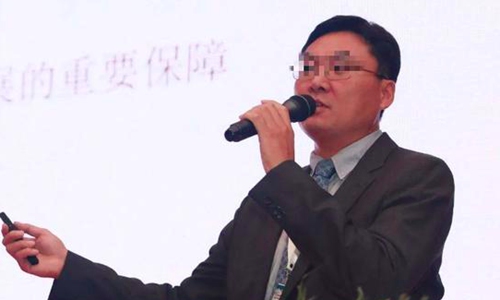Suspected rape by legal professional puts protection of minors under spotlight
By Zhang Han Source:Global Times Published: 2020/4/13 19:00:20

Photo of Bao Yuming
China's central legal authorities are looking into a scandal in which a 48-year-old senior executive of a listed company was accused of raping his teenage "adopted daughter," in a case that has triggered a storm of anger among Chinese netizens since last week.
The Chinese public has been having heated discussions about sexual education, family and society's responsibilities in protecting young girls after a former non-executive director of telecommunications company ZTE and senior executive of oil servicer Jereh company was accused of controlling and raping a girl since 2016.
Bao Yuming reportedly acquired de facto guardianship of Li Xingxing (pseudonym) and had sexual relations with her just after she had passed her 14th birthday four years ago.
The Chinese Ministry of Public Security and the Supreme People's Procuratorate have sent a joint inspection team to supervise local investigation in Yantai, Shandong Province, and follow the case.
The Guangzhou-based South Review, one of the earliest media outlets to cover the case, reported that Bao claimed that he was not Li's adopted father, and their sexual relationship was mutually consensual.
Bao claimed they had maintained contact between 2016 to 2019 voluntarily and denied the accusation that he controlled Li's freedom and raped her.
Bao got to know Li in 2015 through an online forum post where he expressed a wish to adopt a child. In that post, Bao claimed to be a well-educated overseas returnee from a decent intellectual family. Bao had worked in New York and California for about 10 years and obtained US citizenship. He is certified to work as a lawyer in both the US and China, media reported.
Yantai police records showed that Li tried to kill herself in April 2019 and filed a rape case after she was rescued. The case was later retracted as "Bao's actions do not constitute rape" but was reopened in October after Li and her lawyer submitted more evidence.
Bao claimed that Li used her suicide attempt and police reports as methods to attract attention and "achieve ulterior motives." The South Review obtained an audio recording that showed Li went to Yantai to meet Bao after her suicide attempt without telling her mother or people who were trying to help her.
Li's mother was relatively absent from the whole story and appeared to be short of money, which prompted some netizens to suspect that Li's mother actually entrusted Bao to take care of Li, as he was able to aoffer cash and provide better living conditions for the girl. Lawyers who contacted Li and her family said that the girl was very independent. According to media reports, Li seldom contacts her mother and the woman did not know about the girl's experience until Li's suicide attempt.
Li, in news reports, may appear to be dependent on ties with Bao, but that does not mean the relationship can be categorized as voluntary, as Li was just 14 years old and had no idea what a healthy relationship should be like, Weibo user Yunheqiluo posted.
Analysts also underlined the possibility that Li was suffering Stockholm Syndrome. Her lawyer Li Ying noted that a girl who suffers abuse sometimes has to rationalize it and "convince herself to fall in love with the abuser," otherwise she will not be able to handle the suffering.
Net user Yunheqiluo told the Global Times that "Bao, as a legal professional, knew well that he could escape punishment if he could whitewash his disgusting conduct as romance done out of free will."
Liu Changsong, a Beijing-based lawyer, told the Global Times although they may have sexual relations, there is room to judge whether their relationship constituted rape.
According to China's Criminal Law, 14 years is the age of consent for sexual activity, which means violation constitutes rape and can incur up to death penalty.
The public expressed concerns that Bao could have collected evidence over the years to argue that he and Li Xingxing are in a romance and that he did not abuse her. But if the girl has evidence of force and threat even on one occasion, Bao will be prosecuted, Liu said.
Many people, mainly women, also shared their experience of sexual abuse and harassment online to support the victim by saying she is not alone. Netizens also called for legal and administrative changes to address potential loopholes in which a suspect uses economic and knowledge privilege to brainwash and control a girl, turning a rape into a romance.
The case exposed the challenge involved in protecting young girls from disadvantaged families, which requires the whole of society to take more responsibility, including promoting sexual education and offering legal aid, Liu said.
Poor sexual education can make a young girl unaware of what is happening to her and lack the sense to seek help from trusted adults and legal professionals, allowing criminals to walk away, he noted.
RELATED ARTICLES:
Posted in: SOCIETY